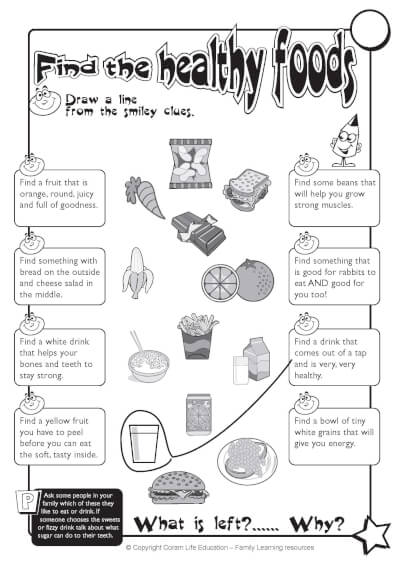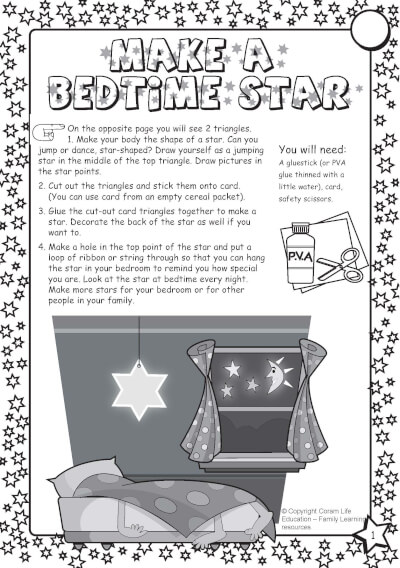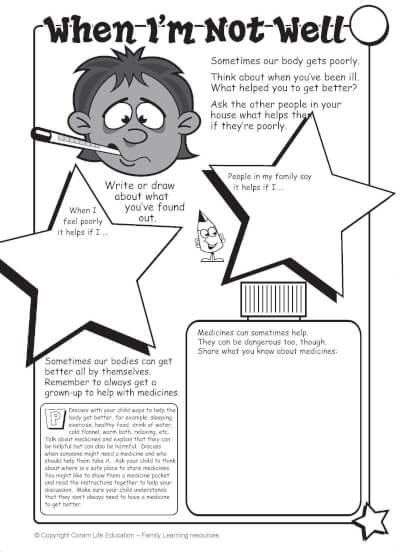SCARF at home – Activities for 3-5-year-olds
What your child will be learning about
- The things we need to keep healthy, including healthy food, exercise and sleep
- How to keep safe when ill - including medicine safety
- Staying safe online
What you can talk about, together
Here are some starter questions for you to talk about;
- What different things help to keep us all healthy?
- Which physical activities and games do you enjoy playing together?
- What are your favourite different healthy foods?
- Why is sleep so important?
- What can we all do to help us sleep well and for long enough?
- What can help us when we're ill? (Try to think of things other than medicines first of all, such as rest, sleep, drinking plenty of water etc.)
- How can medicines be helpful?
- When might medicines be harmful?
What you can do together
Activity 1 - Find the healthy food
Our body needs different types of food to keep healthy. Different foods do different jobs. For example:
- Fruit and vegetables - make us healthy all over
- Carbohydrates - found in cereals, pasta, rice etc. - help give us energy
- Milk and dairy - help our teeth and bones to grow strong
- Fish, meat, beans and nuts have protein - this helps to build our muscles
- Oils and spreads (e.g. butter, or margarine) - help our body to use the vitamins from other foods.
Make a list of favourite fruit and veg, encouraging your child to name lots of different ones.
Next, play Find the Healthy Food.

Click on the picture to make it bigger or to print it.
Print the activity and follow the instructions.
If you don't have a printer your child could draw the different food with your help. As you play the game, talk about the different jobs that different foods do for us.
Activity 2 - Make a bedtime star
Begin with a discussion of why sleep is important. Here are some ideas to get you talking. Sleep helps our body to:
- Grow
- Feel awake and able to concentrate
- Recover after a busy day
- Repair - our body repairs things when we're asleep
- Remember - sleep boosts our memory
- Sort out problems or worries - our brain keeps working when we're asleep and can help is to work out the answer to problems that might be bothering us!
To help us get enough sleep it helps everyone (and that includes adults!) if they have a good bedtime routine.
Find out how much sleep young people need, from the NHS Live Well website, here.
Next, talk about bedtime routines - things we do before going to bed (e.g. stop looking at screens - TV, tablet, phone etc.) put nightwear on, brush teeth, wash hands and face or have a bath, bedtime story, cuddle teddy bear or blanket etc.
Look at the Make a Bedtime Star activity, below. Follow the instructions to help your child make a bedtime star which they can look at as part of their bedtime routine.
If you don't have a printer, draw the triangles on some blank paper or card (e.g. an old cereal packet) instead.

Click on the picture to make it bigger or to print it.
Activity 3 - When I'm not well
Talk about the things we can do to help us get better if we're unwell, e.g. rest, sleep, drink plenty of fluids. Medicines can also help people to get better, but we don't always need to take medicines. Our bodies can help to make themselves better.
Do the activity below together.
If you don't have a printer, you can draw the stars and the medicine bottle on a piece of paper or some card (e.g. from an old cereal packet).

Click on the picture to make it bigger or to print it.
Activity 4 - Stay safe online
Start with a conversation about all the different ways that computers help us (e.g. we can do our shopping, find out the weather forecast, play games, read stories, watch TV etc.)
Then discuss how we have to be careful when using computers. Discuss with your child how they should never share information about ourselves with people they don't know and if they ever see or hear anything scary when playing on a computer they should tell you - or another grown-up at home, straight away.
Here are lots of activities that your child will enjoy, whilst learning really important things about how to keep safe online. These resources have been specially developed for children aged 5 to 7 years old by the National Crime Agency's Child Exploitation and Online Protection Unit.
Click on the link CEOP activities for 4-5 year-olds, here for lots of simple, 15 minute activities to do with your child, helping them to stay safe online.


